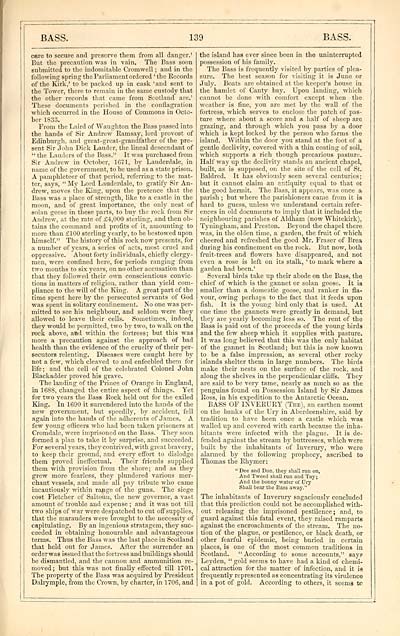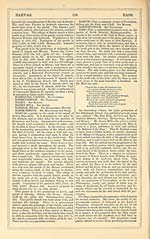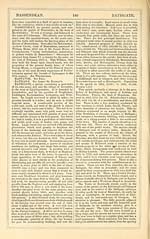Imperial gazeteer of Scotland, or, Dictionary of Scottish topography > Volume 1
(235) Page 139 - BAS
Download files
Complete book:
Individual page:
Thumbnail gallery: Grid view | List view

Cfire to secure and preserve tliem from all danger.'
But the precaution was in vain. The Bass soon
submitted to the indomitable Cromwell ; and in the
following springtheParliamentordcred 'the Records
of the Kirk,' to be packed up in cask 'and sent to
the Tower, there to remain in the same custody that
the other records that came from Scotland are.'
These documents perished in the conflagration
which occurred in the House of Commons in Octo-
ber 1833.
From the Laird of Waughton the Bass passed into
the hands of Sir Andrew Ramsay, lord provost of
Edinburgh, and great-great-grandfather of the pre-
sent Sir John Dick Lauder, the lineal descendant of
" the Landers of the Bass." It was purchased from
Sir Andrew in October, 1671, by Lauderdale, in
name of the government, to be used as a state prison.
A pamphleteer of that period, referring to the mat-
ter, says, " My Lord Lauderdale, to gratify Sir An-
drew, moves the King, upon the pretence that the
Bass was a place of strength, like to a castle in the
moon, and of great importance, the only nest of
solan geese in these parts, to buy the rock from Sir
Andrew, at the rate of £4,000 sterling, and then ob-
tains the command and profits of it, amounting to
more than £100 sterling yearly, to be bestowed upon
himself." The history of this rock now presents, for
a number of years, a series of acts, most cruel and
oppressive. About forty individuals, chiefly clergy-
men, were confined here, for periods ranging from
two months to six years, on no other accusation than
that they followed their own conscientious convic-
tions in matters of religion, rather than yield com-
pliance to the will of the King. A great part of the
time spent here by the persecuted servants of God
was spent in solitary confinement. No one was per-
mitted to see his neighbour, and seldom were they
allowed to leave their cells. Sometimes, indeed,
they would be permitted, two by two, to walk on the
rock above, and within the fortress; hut this was
more a precaution against the approach of bad
health than the evidence of the cruelty of their per-
secutors relenting. Diseases were caught here by
not a few, which cleaved to and enfeebled them for
life; and the cell of the celebrated Colonel John
Blackadder proved his grave.
The landing of the Prince of Orange in England,
in 1688, changed the entire aspect of things. Yet
for two years the Bass Rock held out for the exiled
King. In 1690 it surrendered into the hands of the
new government, but speedily, by accident, fell
again into the hands of the adherents of James. A
few young officers who had been taken prisoners at
Cromdale, were imprisoned on the Bass. They soon
formed a plan to take it by surprise, and succeeded.
For several years, they contrived, with great bravery,
to keep their ground, and every effort to dislodge
them proved ineffectual. Their friends supplied
them with provision from the shore; and as they
grew more fearless, they plundered various mer-
chant vessels, and made all pay tribute who came
incautiously within range of the guns. The siege
cost Fletcher of Saltoun, the new governor, a vast
amount of trouble and expense ; and it was not till
two ships of war were despatched to cut off supplies,
that the marauders were brought to the necessity of
capitulating. By an ingenious stratagem, they suc-
ceeded in obtaining honourable and advantageous
terms. Thus the Bass was the last place in Scotland
that held out for James. After the surrender an
orderwas issued that the fortress andbuildings should
be dismantled, and the cannon and ammunition re-
moved; but this was not finally effected till 1701.
The property of the Bass was acquired hy President
Dalrymple, from the Crown, by charter, in 1706, and
the island has ever since been in the uninterrupted
possession of his family.
The Bass is frequently visited by parties of plea-
sure. The best season for visiting it is June or
July. Boats are obtained at the keeper's house in
the hamlet of Canty bay. Upon landing, which
cannot be done with comfort except when the
weather is fine, you are met by the wall of the
fortress, which serves to enclose the patch of pas-
ture where about a score and a half of sheep are
grazing, and through which you pass by a door
which is kept locked by the person who farms the
island. Within the door you stand at the foot of a
gentle declivity, covered with a tliin coating of soil,
which supports a rich though precarious pasture.
Half way up the declivity stands an ancient chapel,
built, as is supposed, on the site of the cell of St.
Baldred. It has obviously seen several centuries;
but it cannot claim an antiquity equal to that ot
the good hermit. The Bass, it appears, was once a
parish ; but where the parishioners came from it is
hard to guess, unless we understand certain refer-
ences in old documents to imply that it included the
neighbouring parishes of Aldham (now Whitekirk),
Tyningham, and Preston. Beyond the chapel there
was, in the olden time, a garden, the fruit of which
cheered and refreshed the good Mr. Fraser of Brea
during his confinement on the rock. But now, both
fruit-trees and flowers have disappeared, and not
even a rose is left on its stalk, ' to mark where a
garden had been.'
Several birds take up their abode on the Bass, the
chief of which is the gannet or solan goose. It is
smaller than a domestic goose, and ranker in fla-
vour, owing perhaps to the fact that it feeds upon
fish. It is the young bird only that is used. At
one time the gannets were greatly in demand, but
they are yearly becoming less so. The rent of the
Bass is paid out of the proceeds of the young birds
and the few sheep which it supplies with pasture.
It was long believed that this was the only habitat
of the gannet in Scotland ; hut this is now known
to be a false impression, as several other rocky
islands shelter them in large numbers. The birds
make their nests on the surface of the rock, and
along the shelves in the perpendicular cliffs. They
are said to he very tame, nearly as much so as the
penguins found on Possession Island by Sir James
Ross, in his expedition to the Antarctic Ocean.
BASS OF INVERURY (The), an earthen mount
on the banks of the Ury in Aberdeenshire, said by
tradition to have been once a castle which was
walled up and covered with earth because the inha-
bitants were infected with the plague. It is de-
fended against the stream by buttresses, which were
built by the inhabitants of Inverury, who were
alarmed by the following prophecy, ascribed to
Thomas the Rhymer:
" Dee and Don, they shall mn on,
And Tweed shall run and Tay;
And the bonny water of Ury
Shall bear the Bass away."
The inhabitants of Inverury sagaciously concluded
that this prediction could not be accomplished with-
out releasing the imprisoned pestilence; and, to
guard against this fatal event, they raised ramparts
against the encroachments of the stream. The no-
tion of the plague, or pestilence, or black death, or
other fearful epidemic, being buried in certain
places, is one of the most common traditions in
Scotland. " According to some accounts," say?
Leyden, " gold seems to have had a kind of chemi-
cal attraction for the matter of infection, and it is
frequently represented as concentrating its virulence
in a pot of gold. According to others, it seems to
But the precaution was in vain. The Bass soon
submitted to the indomitable Cromwell ; and in the
following springtheParliamentordcred 'the Records
of the Kirk,' to be packed up in cask 'and sent to
the Tower, there to remain in the same custody that
the other records that came from Scotland are.'
These documents perished in the conflagration
which occurred in the House of Commons in Octo-
ber 1833.
From the Laird of Waughton the Bass passed into
the hands of Sir Andrew Ramsay, lord provost of
Edinburgh, and great-great-grandfather of the pre-
sent Sir John Dick Lauder, the lineal descendant of
" the Landers of the Bass." It was purchased from
Sir Andrew in October, 1671, by Lauderdale, in
name of the government, to be used as a state prison.
A pamphleteer of that period, referring to the mat-
ter, says, " My Lord Lauderdale, to gratify Sir An-
drew, moves the King, upon the pretence that the
Bass was a place of strength, like to a castle in the
moon, and of great importance, the only nest of
solan geese in these parts, to buy the rock from Sir
Andrew, at the rate of £4,000 sterling, and then ob-
tains the command and profits of it, amounting to
more than £100 sterling yearly, to be bestowed upon
himself." The history of this rock now presents, for
a number of years, a series of acts, most cruel and
oppressive. About forty individuals, chiefly clergy-
men, were confined here, for periods ranging from
two months to six years, on no other accusation than
that they followed their own conscientious convic-
tions in matters of religion, rather than yield com-
pliance to the will of the King. A great part of the
time spent here by the persecuted servants of God
was spent in solitary confinement. No one was per-
mitted to see his neighbour, and seldom were they
allowed to leave their cells. Sometimes, indeed,
they would be permitted, two by two, to walk on the
rock above, and within the fortress; hut this was
more a precaution against the approach of bad
health than the evidence of the cruelty of their per-
secutors relenting. Diseases were caught here by
not a few, which cleaved to and enfeebled them for
life; and the cell of the celebrated Colonel John
Blackadder proved his grave.
The landing of the Prince of Orange in England,
in 1688, changed the entire aspect of things. Yet
for two years the Bass Rock held out for the exiled
King. In 1690 it surrendered into the hands of the
new government, but speedily, by accident, fell
again into the hands of the adherents of James. A
few young officers who had been taken prisoners at
Cromdale, were imprisoned on the Bass. They soon
formed a plan to take it by surprise, and succeeded.
For several years, they contrived, with great bravery,
to keep their ground, and every effort to dislodge
them proved ineffectual. Their friends supplied
them with provision from the shore; and as they
grew more fearless, they plundered various mer-
chant vessels, and made all pay tribute who came
incautiously within range of the guns. The siege
cost Fletcher of Saltoun, the new governor, a vast
amount of trouble and expense ; and it was not till
two ships of war were despatched to cut off supplies,
that the marauders were brought to the necessity of
capitulating. By an ingenious stratagem, they suc-
ceeded in obtaining honourable and advantageous
terms. Thus the Bass was the last place in Scotland
that held out for James. After the surrender an
orderwas issued that the fortress andbuildings should
be dismantled, and the cannon and ammunition re-
moved; but this was not finally effected till 1701.
The property of the Bass was acquired hy President
Dalrymple, from the Crown, by charter, in 1706, and
the island has ever since been in the uninterrupted
possession of his family.
The Bass is frequently visited by parties of plea-
sure. The best season for visiting it is June or
July. Boats are obtained at the keeper's house in
the hamlet of Canty bay. Upon landing, which
cannot be done with comfort except when the
weather is fine, you are met by the wall of the
fortress, which serves to enclose the patch of pas-
ture where about a score and a half of sheep are
grazing, and through which you pass by a door
which is kept locked by the person who farms the
island. Within the door you stand at the foot of a
gentle declivity, covered with a tliin coating of soil,
which supports a rich though precarious pasture.
Half way up the declivity stands an ancient chapel,
built, as is supposed, on the site of the cell of St.
Baldred. It has obviously seen several centuries;
but it cannot claim an antiquity equal to that ot
the good hermit. The Bass, it appears, was once a
parish ; but where the parishioners came from it is
hard to guess, unless we understand certain refer-
ences in old documents to imply that it included the
neighbouring parishes of Aldham (now Whitekirk),
Tyningham, and Preston. Beyond the chapel there
was, in the olden time, a garden, the fruit of which
cheered and refreshed the good Mr. Fraser of Brea
during his confinement on the rock. But now, both
fruit-trees and flowers have disappeared, and not
even a rose is left on its stalk, ' to mark where a
garden had been.'
Several birds take up their abode on the Bass, the
chief of which is the gannet or solan goose. It is
smaller than a domestic goose, and ranker in fla-
vour, owing perhaps to the fact that it feeds upon
fish. It is the young bird only that is used. At
one time the gannets were greatly in demand, but
they are yearly becoming less so. The rent of the
Bass is paid out of the proceeds of the young birds
and the few sheep which it supplies with pasture.
It was long believed that this was the only habitat
of the gannet in Scotland ; hut this is now known
to be a false impression, as several other rocky
islands shelter them in large numbers. The birds
make their nests on the surface of the rock, and
along the shelves in the perpendicular cliffs. They
are said to he very tame, nearly as much so as the
penguins found on Possession Island by Sir James
Ross, in his expedition to the Antarctic Ocean.
BASS OF INVERURY (The), an earthen mount
on the banks of the Ury in Aberdeenshire, said by
tradition to have been once a castle which was
walled up and covered with earth because the inha-
bitants were infected with the plague. It is de-
fended against the stream by buttresses, which were
built by the inhabitants of Inverury, who were
alarmed by the following prophecy, ascribed to
Thomas the Rhymer:
" Dee and Don, they shall mn on,
And Tweed shall run and Tay;
And the bonny water of Ury
Shall bear the Bass away."
The inhabitants of Inverury sagaciously concluded
that this prediction could not be accomplished with-
out releasing the imprisoned pestilence; and, to
guard against this fatal event, they raised ramparts
against the encroachments of the stream. The no-
tion of the plague, or pestilence, or black death, or
other fearful epidemic, being buried in certain
places, is one of the most common traditions in
Scotland. " According to some accounts," say?
Leyden, " gold seems to have had a kind of chemi-
cal attraction for the matter of infection, and it is
frequently represented as concentrating its virulence
in a pot of gold. According to others, it seems to
Set display mode to: Large image | Transcription
Images and transcriptions on this page, including medium image downloads, may be used under the Creative Commons Attribution 4.0 International Licence unless otherwise stated. ![]()
| Gazetteers of Scotland, 1803-1901 > Imperial gazeteer of Scotland, or, Dictionary of Scottish topography > Volume 1 > (235) Page 139 - BAS |
|---|
| Permanent URL | https://digital.nls.uk/97461950 |
|---|
| Description | Volume I: Aan-Gordon. |
|---|---|
| Attribution and copyright: |
|

